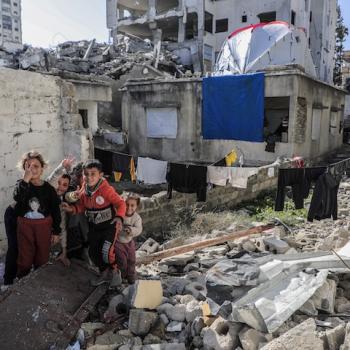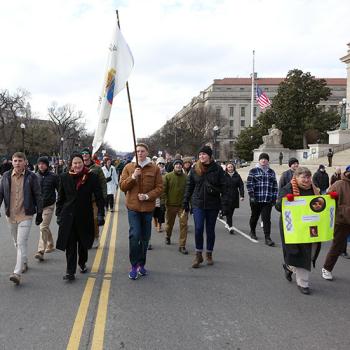 By Bruce Epperly
By Bruce Epperly
Reflections on the scripture texts for Sunday, August 15, 2010
Isaiah 5:1-7
Psalm 80:1-2, 8-19
Hebrews 11:29-12:2
Luke 12:49-56
Today's passages weave together the themes of divine abandonment and human responsibility. Does there ever come a time in life in life when God withdraws God's care and lets us experience the full consequences of our actions? Does God's "tough love" include withholding protection for irresponsible humans? Do our actions limit or enhance what God can do in our lives and the world? Today's passages can challenge us to acts of justice or provide the rationale for theologically dangerous explanations of tragic events in the lives of persons and nations.
Isaiah 5 portrays the story of unrequited love in which despite all efforts to nurture the vineyard, the beloved's vineyard produces wild grapes. The beloved does everything possible to achieve a productive vineyard, fails at the task, and then abandons the field to briars and thorns. The beloved gives up! More than that, the beloved actually tears down the walls that protect the vineyard from unwelcome infestation. The beloved does damage!
Isaiah compares the vineyard to Israel. God delivered this nation from captivity, expected justice and worship, and received in return violence and injustice. God's only recourse is to abandon the nation and its peoples to face the consequences of their action. God withdraws divine protection and the people suffer, corporately and individually.
Psalm 80 describes the prayer for the restoration of a broken nation. Following the same theme as Isaiah 5, the psalmist asks God, who once delivered the nation from captivity, "Why then have you broken down its walls, so that all pass along the way shall pluck its fruit?" The psalmist bargains with God: if you restore the nation to its former glory, if you return to us, then we will always praise you and follow your way. Condemned by their injustice and immorality, the psalmist realizes that only God can restore the people to wholeness. The God who abandons us is also the God who saves! God kills and gives life! Now, that's a spiritual and theological challenge.
Now, it should be clear that in personal, communal, and national life, behaviors lead to consequences, both good and ill. The current global economic crisis is not accidental, but the result of human choices at the macro and micro level. Greed, dishonesty, consumerism, and living beyond our means were factors in the 2009 economic collapse and our ongoing economic woes. Global climate change is not solely the result of changing weather patterns, but also results from human energy use, consumption, and pollution.
To some degree, we reap what we sow in terms of our overall personal and corporate health and well-being. As recent medical studies show, certain religious behaviors lead to positive health outcomes and responses to serious illnesses. On the other hand, stress, obesity, and lifestyle choices can contribute to serious illness. From a holistic perspective, we are not entirely responsible for our health and well-being, but our actions, beliefs, and values play a role in health and illness.
Despite their recognition of the impact of our actions on our personal and national health and well-being, Psalm 80 and Isaiah 5 also describe certain questionable divine behaviors. God gives up on the people, leaving them defenseless. Following this vision of divine decision-making, a number of prominent U.S. religious leaders asserted that the violent events of 9/11 occurred as a result of God withdrawing God's wall of protection over the U.S. in punishment for the nation's immorality. Similar comments have been made about natural disasters such as Katrina and the Haiti earthquake. If we had been morally upright, according to their vision of morality, these events would not have occurred. Further, these passages suggest that God abandons us to our own behaviors, leaving us to suffer without consolation or guidance. God gives up on our lives and our nation, leaving us defenseless before our enemies.
Now, it is true that parents allow children to experience the consequences of their actions, but there are appropriate limits to parental discipline. Any parent, however, who allowed her or his child to experience physical danger or emotional trauma as a form of punishment would be indictable for neglect. Surely, God exhibits greater patience and morality than we human parents do. Yet, we often attribute actions to God that we would condemn if performed by human parents. Accordingly, we need to find a theologically sound way of affirming that our actions make a difference, for good or ill, and shape the form of God's presence in our lives. We need a vision of God that affirms both divine dependability and love and human responsibility. God does not and will not abandon us, but rather works within the limitations created by human freedom.





